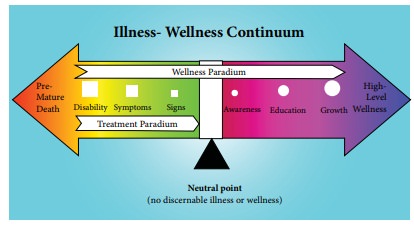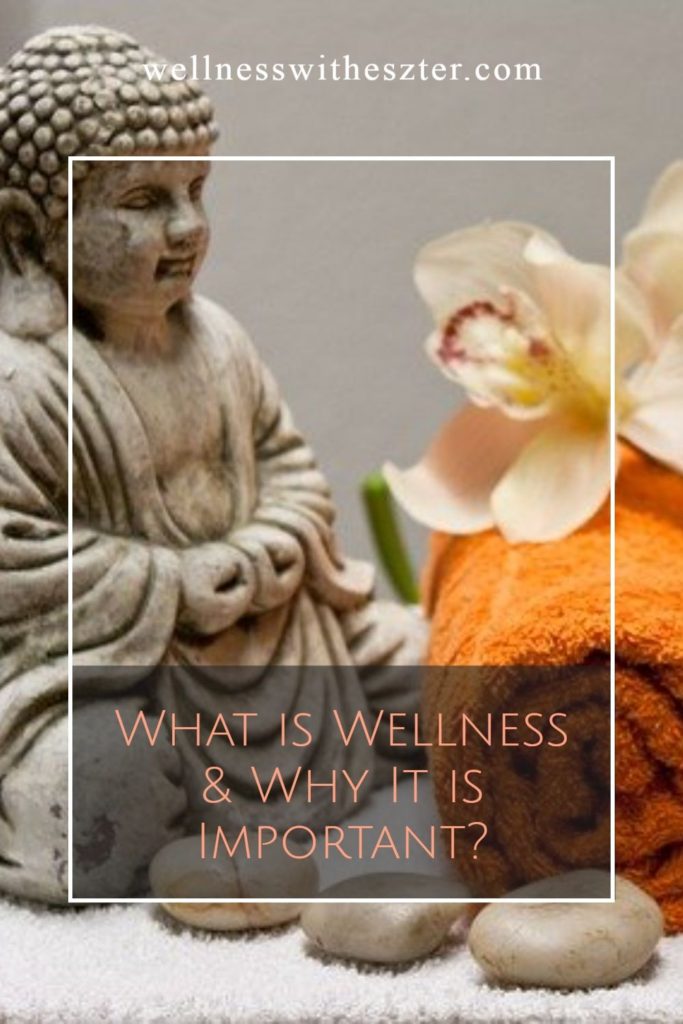Hi, I am Eszter, the author of the blog Wellness With Eszter and after creating content for almost 6 months it is time to answer the question of ‘what is wellness’. In order to consciously establish healthy lifestyle habits and improve personal wellness, I find that it is important to know what is the purpose of creating new habits. Usually, one major goal of changing your lifestyle is to improve your wellness. So let’s discuss wellness.
Health vs Wellness
The reason why I am starting with comparing the terms of health and wellness is that the birth of the word wellness is related to the fact that since 1948 WHO defined health as the aggregation of physical, mental, and social well-being. In the 21st century especially since the early 2010s researchers started to question the WHO definition of health by considering a more holistic approach to general health by including spiritual well being too, which basically created the term wellness (1.).
To understand the gap between health and wellness the most important thing to know is when you think about the body, mind, and soul connection wellness is the often-used term, while ‘health’ focuses on physical and mental factors.
However, it is also being said that good health depends on environmental (especially social) factors as well. (2.) Probably the main difference between wellness and health is that wellness highlights the spiritual factor, however, it does not dig deep into the physical or mental state as much as health does.
What Is Wellness?
By reviewing the previous paragraph I could say that wellness is well-being but in a different sense from health. While health is still focusing on eliminating and preventing illnesses, the focus of wellness is to improve well being regardless of the state of health. Actually, the illness-wellness continuum, which is developed by Travis and Ryan (2004) illustrates the meaning of wellness very well.

While the left side of the figure above introduces a worsening state of health which can be improved with the treatment paradigm, moving to the neutral point which is the state of not being ill.
However, if you are looking at the directional arrow of the wellness paradigm you can see that it steps further by reaching a high level of well-being through awareness, growth, and education. So according to wellness the purpose of life is growing and changing for the better and treating illnesses is only needed to reach that higher level of well-being.
The Dimensions Of Wellness?
To understand the meaning of wellness it is important to be aware of the wellness dimensions. According to the SAMHSA (Substance Abuse and Mental Health Services Association), there are 8 dimensions of wellness. (3.)
- Physical Wellness focuses on the health of the body while taking into consideration the basics of healthy nutrition and exercising, and appropriate health care through sleeping and eliminating ‘bad pleasures’ such as drugs, smoking, and drinking.
- Emotional Wellness refers to expressing feelings and enjoying life by being able to adjust to life changes and coping with stressful events.
- Occupational Wellness relates to daily activities and hobbies that express your views, beliefs, and interests.
- Intellectual Wellness focuses on activities that keep your brain active and keep you creative.
- Social Wellness relates to your relationship with friends and family members and being a part of a community.
- Spiritual Wellness takes into account one’s personal beliefs and views and the ability to be aware of your life purpose.
- Financial Wellness pays attention to your personal needs through thinking about the best income, cost, and saving options.
- Environmental Wellness deals with being safe and being able to access important amenities for living.
The SAMHSA also emphasizes that it is important to create a balance between these 8 dimensions and not getting lost in only one of them. For example, when we are trying to create financial wellness we often forget about physical wellness. Or when we are focusing too much on social wellness we might forget about spiritual wellness which is our personal views. That being said the balance could be different for each person because someone might need to focus on a specific dimension more at a certain point in life.
However, if you take into consideration these 8 dimensions you have definitely taken good care of your life.
So, Why is Wellness Important?
The reason for that is wellness is looking at your well being in a broader and more perspective way. If you want to live a meaningful life, you want to be really true to yourself and think back to your life as an interesting journey, then you should definitely start digging into your wellness. If you spend your life dealing with health issues and trying to be fit and healthy, then you could lose the connection with other important elements of your life that could actually play a big part in your physical and mental health as well.
How can you improve your personal wellness?
If you want to apply a holistic approach and focus on your wellness then I definitely recommend starting really thinking about what are the 8 dimensions of wellness for you.
I hope by now you have a picture of what wellness is and you understand ‘why wellness is important’.
So take an hour and think about how you can improve your wellness!
If you need support in the development of your health and fitness in a very person-centered way then you might benefit from working with a weight loss coach.
Stay safe and healthy,
Eszter
Did you find this post helpful? Save this PIN BELOW to your Wellness Tips, Health and Wellness, Healthy Living, Weight Loss, or Healthy Lifestyle board on Pinterest!





Pingback: What does a Health Coach do & When It Is Time To Hire One - Wellness with Eszter